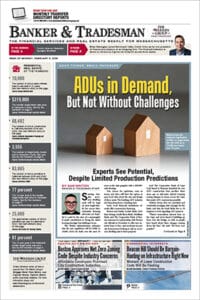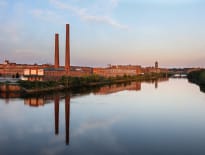
Downtown Hudson’s fortunes seemed to have bottomed out in 2008, with more than two dozen empty storefronts attesting to its steady decline.
Downtown Hudson’s fortunes seemed to have bottomed out in 2008, with more than two dozen empty storefronts attesting to its steady decline.
Competition from big box stores had rendered the Main Street of this western Middlesex County town an afterthought, and the Great Recession finished off many of the remaining shops.
Today the downtown district has just one vacant storefront, after five years of rapid recovery that’s seen an infusion of upscale restaurants, craft drink purveyors and new boutiques.
“Some of it’s coincidence and some of it’s luck,” said Jack Hunter, Hudson’s planning and community development director. “It’s a manageable downtown. It’s not too big and not too small. The buildings had not been demolished and they stood the test of time.”
It’s a story of brick-and-mortar survival in the age of Amazon, though local merchants and officials struggle to put a finger on a single factor that saved downtown Hudson. Several common threads emerge from conversations: a unified downtown business community, supportive town government, a generational shift back to Main Street shopping and the growing role of upscale restaurants and bars as retail anchors.
Rail Trail Flatbread Co.’s opening in December 2012 was a watershed, many locals agree. Co-owner Michael Kasseris and his business partner Karim El-Gamal, two Babson College MBAs, were looking for a pizza shop location in and around Boston but were driven off by the high rents.
They broadened their horizons to Hudson, where they converted a vacant double storefront in a building owned by Kasseris’ uncle into a 110-seat pizzeria with an extensive craft beer list. They expanded across the street in May 2015 with a homemade ice cream shop, New City Creamery, followed by the speakeasy-style bar Less Than Greater Than in October 2015.
“The town needed a place to call its own,” Kasseris said, as diners packed Rail Trail on a recent Monday afternoon. “There’s a changing environment in real estate in Massachusetts and people are moving more out to Route 495 and MetroWest. People expect to come and have a good time in downtown Hudson.”
Amaia Martini Bar and Medusa Brewing Co. opened in 2015, creating energy at the opposite end of downtown. Medusa is now planning a $5.5 million expansion on a vacant parcel on Houghton Street.
Michael Murphy, president of Hudson-based Murphy Insurance, credits Rail Trail with putting the town on the map.
“It’s hard to say which was the chicken and which was the egg, but it’s a combination of recognizing that we had a problem along with getting lucky,” he said. “Those guys are very bright and capable.”
Hudson’s strict historic preservation guidelines have helped the downtown maintain its well-kept appearance through up-and-down economic cycles, said Sarah Cressey, CEO of the Assabet Valley Chamber of Commerce.
“Oftentimes people judge a town’s success based on their downtown: good, bad or indifferent,” Cressey said. “People don’t say, ‘Honey, let’s go drive through the industrial park.’ Sometimes it’s not a fair way to judge a community, but it is a fact.”
Recent changes to town zoning are designed to encourage in-fill development in and around the downtown, Hunter said. Housing is now allowed on the upper floors of commercial buildings, a practice the town had previously forbidden but not enforced. And there are no more minimum parking requirements for new commercial developments. The town is in discussions with owners of privately-owned parking lots about providing spaces after business hours, when the restaurant scene generates more demand.
A Shoe Town Goes Digital
A former mill town on the Assabet River, Hudson lost its shoe factory manufacturing base in the early 20th century. While large office parks were built in neighboring communities such as Marlborough, Hudson struggled because of its isolation from major highways.
In the 1970s, Hudson economic development official Argeo “Junior” Cellucci Jr., father of the late Gov. Paul Cellucci, lobbied state officials to extend I-290 to Route 495. It paid off with Digital Equipment Corp.’s decision to build a plant in Hudson. Current owner Intel Corp. closed the Hudson chip-manufacturing plant and laid off its 700 employees in 2013. Today, most residents travel out of town to work, said Mark O’Connell, CEO of Hudson-based Avidia Bank.
At the same time, Hudson has become a haven for commuters to Boston and Route 128 attracted by the town’s relatively affordable home prices. The median single-family home price year-to-date is $347,000, according to data from The Warren Group, publisher of Banker & Tradesman, and listings don’t linger on the market.
“Houses sell pretty much immediately unless they have some issues,” O’Connell said. “People in the Waltham area are coming out a little further because prices are pushing everybody out.”
Remaining Merchants Band Together
Arthur Redding had operated his Hudson Appliance store in the heart of Main Street since 1972 and had a first-row seat to watch the departure of locally-owned clothing and furniture shops. By 2008, he’d seen enough.
He met with a half-dozen of the remaining merchants about reviving the dormant Hudson Business Association, each of them pitching in a few thousand dollars for cosmetic improvements and offering prospective newcomers assistance with permitting. Out-of-town investors acquired other buildings and made cosmetic improvements to facades, attracting new tenants. Redding took advantage of the downturn to acquire a dilapidated building next door and combined it with his store, effectively tripling the space.
Today the business group has approximately 50 members. Only one storefront is vacant, and the group is trying to find spaces for at least two additional restaurants and a boutique.
“Rents are going up, and there is a big demand,” Redding said. “We have some specialty-type stores that would like to come to downtown and we’ve got to find spots for them.”
Prompted by Hunter’s arrival at Town Hall in 2015, downtown merchants began to consider the idea of a downtown improvement district. The program, approved by a vote of property owners and then Hudson selectmen in November, imposes a surtax on 106 downtown properties beginning in January to pay for beautification, community events and marketing the district. The surtax is expected to generate a $120,000 annual budget.
“We were looking for ways to keep this going,” Murphy said. “There are a lot of one-off ideas, but funding becomes a challenge. The key is being able to show people tangible results. We want to make sure they see value right away.”








